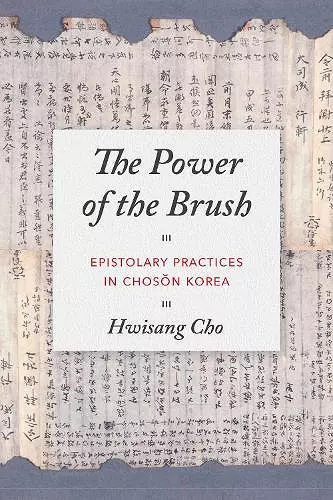The Power of the Brush
Epistolary Practices in Chosŏn Korea
Hwisang Cho author Clark W Sorensen editor
Format:Hardback
Publisher:University of Washington Press
Published:15th Dec '20
Currently unavailable, and unfortunately no date known when it will be back
This hardback is available in another edition too:
- Paperback£27.99(9780295747811)

Finalist for the inaugural ACLS Open Access Book Prize
Honorable Mention, 2022 James B. Palais Book Prize from the Association for Asian Studies (AAS)
Honorable Mention, 28th Annual Modern Language Association Prize for a First Book (MLA)
Shortlisted for the 2021 George A. and Jeanne S. DeLong Book History Book Prize from the Society for the History of Authorship, Reading and Publishing (SHARP)
How a letter-writing revolution facilitated social change in premodern Korea
The invention of an easily learned Korean alphabet in the mid-fifteenth century sparked an “epistolary revolution” in the following century as letter writing became an indispensable daily practice for elite men and women alike. The amount of correspondence increased exponentially as new epistolary networks were built among scholars and within families, and written culture created room for appropriation and subversion by those who joined epistolary practices.
Focusing on the ways that written culture interacts with philosophical, social, and political changes, The Power of the Brush examines the social effects of these changes and adds a Korean perspective to the evolving international discourse on the materiality of texts. It demonstrates how innovative uses of letters and the appropriation of letter-writing practices empowered elite cultural, social, and political minority groups: Confucians who did not have access to the advanced scholarship of China; women who were excluded from the male-dominated literary culture, which used Chinese script; and provincial literati, who were marginalized from court politics. New modes of reading and writing that were developed in letter writing precipitated changes in scholarly methodology, social interactions, and political mobilization. Even today, remnants of these traditional epistolary practices endure in media and political culture, reverberating in new communications technologies.
The Power of the Brush is freely available in an open access edition thanks to TOME (Toward an Open Monograph Ecosystem) and the generous support of Emory University and the Andrew W. Mellon Foundation.
DOI 10.6069/9780295747828
"Through the lens of epistolary practice, The Power of the Brush revisits many important issues required for a critical understanding of late Choson society."
* The Seoul Journal of Korean Studies *"Well illustrated with relevant examples of letters, and including helpful tabulations, this study covers an enormous range of historical and political experience, bravely attempting to compare Korean and other societies’ letter writers, as well as the persistence of letter petitions in modern South Korea."
* Journal of Asian Studies *"Hwisang Cho's book is a welcome addition to a nascent body of English-language scholarship on the study of Korean letters and provides vital insight into how epistolary practice in sixteenth-century Chosŏn spurred sociocultural and political change."
* Acta Koreana *"The Power of the Brush further enriches the understanding of Chosŏn elite’s political epistolary writing…[O]ur understanding of premodern Korean humanities would be incomplete without this book."
* Harvard Journal of Asiatic Studies *"This book, with its rich content and detailed historical information, discusses the social and political situation of Chosŏn Korea in terms of epistolary practice and thereby provides a new window into Korean culture."
* Religious Studies Revi- Commended for MLA Prize for a First Book 2021 (United States)
- Commended for James B. Palais Prize 2022 (United States)
- Short-listed for George A. and Jeanne S. DeLong Book History Prize 2021 (United States)
- Short-listed for ACLS Open Book Prize + Arcadia Open Access Publishing Award 2023 (United States)
ISBN: 9780295747804
Dimensions: unknown
Weight: 599g
290 pages